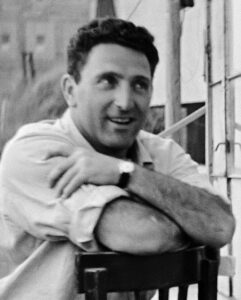
Irwin Shaw
I once told a class I was teaching that writing is an intellectual contact sport, similar in some respects to football. The effort required can be exhausting…and you are hurt on almost every play; but that doesn’t deprive you from getting peculiar pleasures from the game. — Irwin Shaw
Discuss!

Even on my worst day of writing, if I write one thought like I see it in my head, there’s no high like it.
One true sentence, Patricia! Well said. Sometimes, I feel like my brain just slides over the surface of my intended meaning. When I go back and edit, I see and hear and feel the “vanilla” voice. I’ve struggled with voice for years, but lately, thank God, it feels like all ya gotta do is slow down and write, just as you say, “one thought like [I] see it in my head.” Powerful insight. Inspiring!
LOL! Being a non-sports enthusiast (exception being an occasional tennis watcher) and finding the game of football particularly boring (for me it’s just a bunch of guys running around knocking each other over for a couple of hours. I know–GASP!), I didn’t think I could draw any comparisons between the two but I was wrong.
Writing may have its hardships but it’s not torture. It’s fun to research, to brainstorm, to chat with others about. But there is the occasional hitting of a wall where you get stuck on a part of the story for a while (the first tackle). But you finally get up, go again and are probably going to get tackled again.
But you deal with the temporary blows and keep coming back for each new game (unless you get cut from the team). At least with writing, unlike football, the only one who can cut us from our writing team is we ourselves.
Great analogy
1. You must have a desire to play/write or none of what follows will succeed.
2. You must learn the rules. You can’t play/write successfully until you learn the rules – grammar, structure, etc/the rules of the game
3. You must practice, practice, practice or you will not succeed at writing or playing
4. Perseverance, persistence, tenacity, determination – all are required for success, to get up when you get knocked down and keep on keeping on
5. You must never think you have arrived. There’s always another battle to fight. There’s always something to learn. Learn from your mistakes.
6. You must enjoy writing/playing enough that you continue to repeat all of the above.
Shaw’s analogy rings true for me. Steve laid out the particulars really well. I’d add that you need participate–practice, get bruised, get knocked down, get up, continue until you finish the story or book, and begin it all over again. Don’t be one of those who says they’ll write a novel someday. Begin now. Be in the arena, as Teddy Roosevelt wrote.
Well said, Dale
And another one, let go of fear (fear of failure) – just do it!
I like the analogy, and I also agree with Steve’s list. Most importantly, you have to love the game you’re in.
I’ve heard it said that one can improve his/her skill in a sport just by watching the experts play. I think that goes for writing. Reading good literature makes one a better writer.
I use pro sports as an analogy to having pro craft. You can’t play pro basketball if you can’t dribble and shoot which takes years of practice, and you can’t write competent fiction if you can’t craft sentences, character, and plot which takes years of practice.
So . . . stretching the metaphor (oh, it hurts so good! ;-)), yes, we get hurt every play, but pain teaches us how better to run the plays, stick to our route, and bust through the linebackers on top of us. That is the challenge, not just staying in the game but winning. It’s what gives me that “peculiar pleasure.” As a lineman, I love the cross block, and I’m here not only to get hurt but to inflict a little pain. Go, Chiefs!
If you just show up at practice, you’ll get a feel for the game, but you’ll be stagnant, simply another place holder on the field. If you show up to practice and work hard, you’ll improve and eventually play in a game in which you’re proud of your performance.